YWT: More on Bush/Maliki

Length: 3:16
LARGE (38.3 MB) ----- SMALL (3.9 MB)
JIM CLANCY: Hello, everyone, and welcome back to YOUR WORLD TODAY.
There has been a veritable verbal surge in the war of words between Washington and Baghdad this week. U.S. President George W. Bush has said he's frustrated at the apparent inability of Iraqi leaders to overcome even their minor political and sectarian differences, much less the major ones.
He toned down his criticism in a speech that we heard just barely an hour ago, saying the Iraqi prime minister is, in his words, a good guy. But Iraq's prime minister, Nuri al-Maliki, in Syria, fired back, saying no one has the right to dictate timetables to a government that was elected by its own people.
Let's bring in Michael Ware from Baghdad to talk about the growing rift between U.S. and Iraqi leaders.
Michael, you look at this and you say, well, what's the real problem here? Isn't the real problem that the militias are in charge of Iraq and Iran seems to have greater control over those militias?
MICHAEL WARE, CNN INTERNATIONAL CORRESPONDENT: That's completely right, Jim. I mean, essentially, there's been much criticism of Iraqi Prime Minister Nuri al-Maliki. He's being blamed by many in Washington for failing to deliver on much of the key agreements and political reconciliation that needs to be achieved here.
But honestly, it's stunning that people could do that. I mean, you need to bear in mind, Prime Minister Maliki has virtually no power over his own government. Of his 37 cabinet members, 17 are either boycotting his government or simply fail to attend cabinet meetings. He can't supply regular electricity, and sometimes he can't even get running water in his own capital.
The currency of political power within this government is the strength of your militia, most likely Iranian-backed. Maliki does not have a militia; therefore, he has no real authority.
So, America cannot expect him to deliver.
CLANCY: Here's the basic question that's got to be on the minds of U.S. military commanders, as well as the White House. And that is, if Maliki isn't in charge, who is, really?
WARE: Well, really, it's a loose alliance of militia power blocs. And obviously, their power brokers, most of whom, if not all of whom, according to U.S. intelligence, have links to Iran, are supported by Iranian intelligence, or the Revolution Guards Corps.
Bottom line, Iran has more influence with this government than America can probably ever hope to have. Now, this is prompting some generals, field commanders here, to say, well, maybe we are not going about this the right way. Maybe democratic institutions are not the way ahead.
They've certainly, for the first time ever, openly said democracy may actually just be an option for Iraq. Iraqis may choose something else. And the U.S. mission here says we are no longer pursuing the same lofty and ambitious democratic objectives we once were.
So, there's a lot of people saying, have we gone about this the wrong way and do we need to take a new track?
CLANCY: All right.
Michael Ware reporting from the ground in Baghdad.
As always, Michael, thank you -- Hala.
